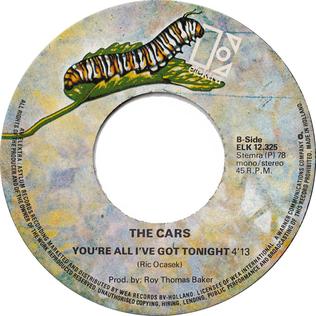
"Smoke on the Water" is a song by English rock band Deep Purple, released on their 1972 studio album Machine Head. The song's lyrics are based on true events, chronicling the 1971 fire at Montreux Casino in Montreux, Switzerland. It is considered the band's signature song and its guitar riff is considered to be one of the most iconic in rock history.
"The Rover" is a song by English rock band Led Zeppelin written by guitarist Jimmy Page and singer Robert Plant. Although mostly recorded years earlier, it was released on the group's 1975 double album, Physical Graffiti.
"Black Diamond" is a song by American hard rock band Kiss, written by rhythm guitarist Paul Stanley. "'Black Diamond' was written almost exactly as it is," he said, "except that the riff wasn't there; Gene [Simmons] brought that part in … It's all about arrangement and embellishment. That's what you're supposed to do in a band: come in and add something. But that doesn't mean you wrote the song."

"Space Truckin'" is a song by English hard rock band Deep Purple. It is the seventh and final track on the Machine Head album and its lyrics talk of space travel.

Nikolai Ivanovich Noskov is a Russian singer and former vocalist of the hard rock band Gorky Park. Five-time winner of the Golden Gramophone. He was also a member of Москва (Moscow) ensemble in the early 1980s, in band Гран-при in 1988, just before joining Gorky Park, and much later in the 1990s in band Николай (Nikolai). Starting 1998, Noskov had a solo career releasing six solo albums. In 2015, he was jury in second season of reality TV series Glavnaya Stsena.

"Sabbath Bloody Sabbath" is the opening title track of English heavy metal band Black Sabbath's 1973 album of the same name.

Yury (George) Chernavsky is a Russian producer, composer and songwriter. Chernavsky is a member of performance rights organisations such as GEMA, BMI, and RAO, and has also been recognized as an Honored Artist of the RSFSR.

David Fyodorovich Tukhmanov PAR is a Soviet and Russian composer. People's Artist of Russia (2000), State Prize of Russian Federation.

"You're All I've Got Tonight" is a song by the American rock band the Cars, from their debut album, The Cars. Like "Bye Bye Love" and "Moving in Stereo", two other songs from the album, it continues to receive airplay on classic rock stations today despite never having been released as a single.

Monologue of Love is the studio album by Soviet singer Sofia Rotaru, released in 1987 by Melodiya. The long play album was simultaneously released for the Soviet and international market. The album includes songs performed in Russian with new rock style arrangements by leading Soviet pop and rock bands: Vesyolye Rebyata, Forum, Chervona Ruta. This album is a soundtrack album to the movie Monologue of Love released in 1986.
VIA is an abbreviation for Vocal and Instrumental Ensemble. It is the general name used for popular music bands that were formally recognized by the Soviet government from the 1960s to the 1980s.

"Good Times Bad Times" is a song by the English rock band Led Zeppelin, featured as the opening track on their 1969 debut album Led Zeppelin. The song was Led Zeppelin's first single released in the US, where it reached the Billboard Hot 100 chart.

Aleksander Aleksandrovich Barykin (Byrykin) (Russian: Александр Александрович Барыкин (Бырыкин); February 18, 1952 — March 26, 2011) was a Soviet and Russian singer and songwriter.

"It's Hard" is a song written by Pete Townshend that featured on British rock band The Who's tenth album, It's Hard, of which it was the title track. It was released as the third and final vinyl single from the album in 1983, backed with the John Entwistle written song "Dangerous", but failed to chart, although it reached number 39 on the Billboard Hot Mainstream Rock Tracks. This would become the last Who single of new material until "Real Good Looking Boy" in 2004, and the last album single by them until "Black Widow's Eyes", two years later.

Minutochku is a studio album by Russian band Vesyolye Rebyata.

Druzhit' Nam Nado is second studio album by Soviet VIA Vesyolye Rebyata.

Kak Prekrasen Etot Mir is an EP by Russian rock band Vesyolye Rebyata.

Dvaccać vośmaja zorka is the fourth album by Belarusian hard rock band Mroja, released on 4 September 1990. It is the only album the band released on the Soviet state label Melodiya.

Arlekino i drugiye is the second studio album by Russian Soviet singer Alla Pugacheva released in 1979 by Melodiya.
Electroclub is a Soviet and Russian electropop group founded in 1986.
















